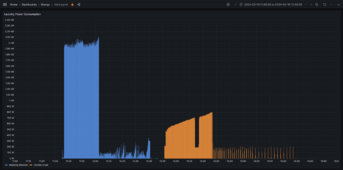I ended up having to do this mod. Because so much lent was getting by the filter on the coils. But love the unit so far.Ive had the GE Profile since early September and have around 160 loads of laundry through it. We LOVE this machine. Firstly, even though we're not on solar yet, for a full wash and dry the machine ONLY uses .8-1.5 kWh! It replaced an old washer and dryer unit where the dryer was 28amp/220v! Based on my utility rate, I save 50 cents or more per use, not counting that this machine uses less water too so there is savings there as well.
There is a bit more maintenance involved but as this is a DIY group, I assume most people here are more than capable of it. I vacuum the inside of the coil area probably ever 15-20 cycles, clean the lint filter off after every cycle (which I did with my old dryer anyway) and drain/clean the pump filter every 30-40 cycles. It's really not much and for the convenience it provides our family along with the money savings, it's a no brainer. Even better if youre trying to cut solar usage.
You are using an out of date browser. It may not display this or other websites correctly.
You should upgrade or use an alternative browser.
You should upgrade or use an alternative browser.
Possible laundry solution
- Thread starter Roddzilla
- Start date
MidwestBest
Redneck Engineer
so i havent read all the previous messages yet but i have the all in one LG version for several years now ( about 3 or 4) and i love it! i would rather have the new ge version since it has a lint screen but mine doesnt use much as it has a heat pump to pull the water out and works great. i have 7 inside pets that shed a lot so animal hair can be a pain to clean a lot but it is manageable if not neglected.
That being said i am also fully on solar and i only have 1 eg4 3000ex running my whole barn and 9 400watt panels. and i can do 3 loads in a day when its sunny and still end the day fully charged with 15kw of eg4 server racks. on a normal day i can do 1 or 2 loads a day and still be fully charged at the end of the day. i used to remeber how much they take to run a cycle but iv gotten so used to knowing if i can by the weather i dont actually keep track i just glance over and see if im at 30% in the moring and if i am i have nothing to worry about. without running it i only use about 6kw a day in my 24Wx40Lx16H barn. (i do have almost 4 inches of closed cell spray foam which helps a lot.) not sure if this is helpful for anyone but saves a lottt of room and not needing to run 220v is amazing to me! also never having to switch from washer to dryer is probably my favorite part! it just does both and bam its all ready to fold!
That being said i am also fully on solar and i only have 1 eg4 3000ex running my whole barn and 9 400watt panels. and i can do 3 loads in a day when its sunny and still end the day fully charged with 15kw of eg4 server racks. on a normal day i can do 1 or 2 loads a day and still be fully charged at the end of the day. i used to remeber how much they take to run a cycle but iv gotten so used to knowing if i can by the weather i dont actually keep track i just glance over and see if im at 30% in the moring and if i am i have nothing to worry about. without running it i only use about 6kw a day in my 24Wx40Lx16H barn. (i do have almost 4 inches of closed cell spray foam which helps a lot.) not sure if this is helpful for anyone but saves a lottt of room and not needing to run 220v is amazing to me! also never having to switch from washer to dryer is probably my favorite part! it just does both and bam its all ready to fold!
MidwestBest
Redneck Engineer
not sure if anyone has answered this yet but i have had one many years and left a few details in the above post and will add that is uses about 1800w max pullAnyone on this thread tried the LG combo yet?
I watched a few videos, and I think I understand why it is $400 cheaper and smaller than the GE (current prices on Costco). The heatpump is smaller and squished inside the spare footprint of a regular 5 cu ft washer. Versus adding a "hat" for the GE. Longer compressor-specific warranty on the GE (5 year), while LG covers it under the 1 year general (2 year at Costco). If the short LG warranty gives enough pause to pique interest in adding an extended warranty, the price gap gets a lot smaller.
DPC
Solar Enthusiast
I have a completely different take on off grid laundry
I have a Simplicity wringer ( a Canadian made sister brand to Speed Queen ) and a Maytag Orbital
To run off inverters or generators?
Gasoline engine conversions with both are pretty easy go completely non electric.
Heat recovery from engine exhaust can heat air for a drier...
Question is to convert these old units or run one or the other as built...
The alternator with a BLDC drive off 24VDC???
New machines are not going to be some easily modified for off grid.
I have a Simplicity wringer ( a Canadian made sister brand to Speed Queen ) and a Maytag Orbital
To run off inverters or generators?
Gasoline engine conversions with both are pretty easy go completely non electric.
Heat recovery from engine exhaust can heat air for a drier...
Question is to convert these old units or run one or the other as built...
The alternator with a BLDC drive off 24VDC???
New machines are not going to be some easily modified for off grid.
dopeassjackson
New Member
Has anyone just ran a gas dryer? We plan on getting a over/under washer/dryer for our cabin. We dont live there but would be nice not to have to pack bedding back and forth. And honestly the all in one units your guys are talking about cost way more than I would even spend on a laundry for my house.
DPC
Solar Enthusiast
BE REAL CAREFUL what you buy.I'm on a second hand ~45 year old dryer that's been repaired and repainted. Top load Whirlpool washer is second hand and ~20 years old replaced when the mate to the ~45 year dryer crapped out. I have maybe $400 invested in acquisition and repair costs. Washer only uses about 0.2-0.3kWh/load, but the dryer is probably at least 1.5-2.0.
When either of these craps out, I'll be ready to commit to something modern, and I'm hearing nothing but good about the GE combo. I'm also looking to cut my work load... I load, move, unload. Wife folds. I'm lookin' to cut out the "move" step....
Modern machines are very cheaply built and they designs have been made with a consideration towards low water use and efficient motors.
This does not equate to a long life or even a good job washing.
Your WP is probably a late model of the DD system.
These were washer designed back when whirlpool was asking the techs in the field what they thought and it shows in the ease of service and reliability.
THE WP dryers are also pretty easy to work on with little to go wrong.
fast forward to today the current generation of WP products are designed around a completely different style of tub suspension and the drives have a lot of plastic parts circuit boards and my god the " SPLUTCH "!
I have a WMV system in my wife's Maytag ( now part of whirlpool ).
Its not all its cracked up to be for reliability even in the commercial version
I'm not going to tell you what to buy.
Doesn't matter your going to be disappointed when your DD ( direct drive ) dies and your looking at its disappointing replacement.
Something to think about.
A maytag orbital is all pulley driven pretty simple....
Spin pulley one way it washes other way it pumps and spins.
You could run off your batteries with a DC motor or go completely stone age and run a lawnmower engine
DPC
Solar Enthusiast
Many brands of dryer had a gas kit that replaced the electric on your drier at the factory.Has anyone just ran a gas dryer? We plan on getting a over/under washer/dryer for our cabin. We dont live there but would be nice not to have to pack bedding back and forth. And honestly the all in one units your guys are talking about cost way more than I would even spend on a laundry for my house.
Of these many had propane versions....
How handy are you ?
Odds are you could buy a used gas drier and change it to propane if you don't have NG
OLD washers and dryers are not difficult to work on.
The older and more privative ones you find the more likely you are to be able to fix them
You can do some really crazy off grid stuff with old machines for nothing but the cost of your time and scraps.
What kind of washer is this?
Cant tell I think its a Maytag too but not an Orbital ,might have the earlier "Newtonian tranny "
DPC
Solar Enthusiast
I'm down the rabbit hole again.
This is a Canadian dept store brand washer made by GSW or MacGraw Edison I believe.
Horizontal input shaft on this machine.
Now your completely Grid independent and have a machine you can fix with a rock.
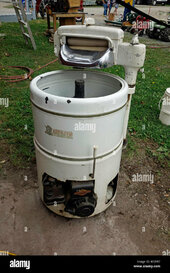
Ain't that a slick way to wash....
But I would be looking for a GXV140 clone off a smaller modern lawn mower.
Waste less fuel, cleaner lower emission.
This is a Canadian dept store brand washer made by GSW or MacGraw Edison I believe.
Horizontal input shaft on this machine.
Now your completely Grid independent and have a machine you can fix with a rock.

Ain't that a slick way to wash....
But I would be looking for a GXV140 clone off a smaller modern lawn mower.
Waste less fuel, cleaner lower emission.
DPC
Solar Enthusiast
Im just about over this stuff.
However a dryer pulls around 7 amps to run a fractional Hp motor.
You just need a heat source
This guy has a good set up but mentions in the article he does not get as much heat
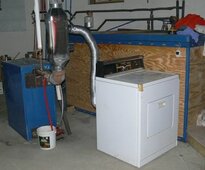
Another one I found using hot water from a boiler to warm the air.
I would look hard at a counter flow heat exchange anyhow to strip heat off the moist exhaust air before I used the water to try and drive up the temperature higher
If you using heat from you home instead of waster process heat like the fuel gases from a boiler your going to want to get your moneys worth from the wood...
Some observations of the build
The heat exchange is too short, it should use the counter flow principle, and its not insulated on the outside to conserve what he it can strip off the boiler.
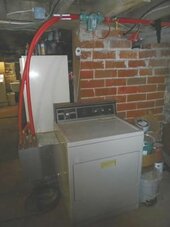
Is this is a very practical solution in winter....
Summer Meh...
A rocket stove heat source is a simple idea but for long burns like an hour drying cycle I would take a long look at both primary and secondary air control with a damper to really keep the heat at a level where your not going to scorch your clothing.
You still have left over process heat.
You could heat water for a another load in the washer or a shower
For the not familiar with the rocket stove....
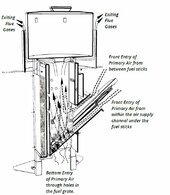
However a dryer pulls around 7 amps to run a fractional Hp motor.
You just need a heat source
This guy has a good set up but mentions in the article he does not get as much heat

Another one I found using hot water from a boiler to warm the air.
I would look hard at a counter flow heat exchange anyhow to strip heat off the moist exhaust air before I used the water to try and drive up the temperature higher
If you using heat from you home instead of waster process heat like the fuel gases from a boiler your going to want to get your moneys worth from the wood...
Some observations of the build
The heat exchange is too short, it should use the counter flow principle, and its not insulated on the outside to conserve what he it can strip off the boiler.

Is this is a very practical solution in winter....
Summer Meh...
A rocket stove heat source is a simple idea but for long burns like an hour drying cycle I would take a long look at both primary and secondary air control with a damper to really keep the heat at a level where your not going to scorch your clothing.
You still have left over process heat.
You could heat water for a another load in the washer or a shower
For the not familiar with the rocket stove....

Last edited:
wattmatters
Solar Wizard
wattmatters
Solar Wizard
Yes, the washing machine heats its own water. In this case a 60°C (140°F) wash. Our water heating is electric anyway, so no gain from using our regular hot water supply (e.g. if it were a heat pump water heater then there would be). And being a water efficient washer, it also means energy used for heating water is kept to just the water it needs for the load (auto sensing).Is that electrically heated water in the washer?
(I guess that's what "60C" means)
Wife insisted I use the 60°C setting as it was better at removing odour from my clothes. Otherwise I would generally run cooler washing temps. I also hang clothes out normally, unless the weather requires use of the dryer.If you've got it, flaunt it? (otherwise, wash in cold water.)
Hedges
I See Electromagnetic Fields!
- Joined
- Mar 28, 2020
- Messages
- 20,694
I would want electric storage water heater as a dump load. Cheaper energy storage than batteries.
One washing machine brand showed how much cleaner bloodstained clothes were when soaked in cold water first.
(If you're of the persuasion that gets clothing bloody, you're supposed to know that already.)
I had a Miele with 240V input that optionally heated water. (RIP)
One washing machine brand showed how much cleaner bloodstained clothes were when soaked in cold water first.
(If you're of the persuasion that gets clothing bloody, you're supposed to know that already.)
I had a Miele with 240V input that optionally heated water. (RIP)
wattmatters
Solar Wizard
All our stuff is 230 V AC.I had a Miele with 240V input that optionally heated water.
Ours is heated using a smart PV diverter which varies power based delivered to the heating element based on available excess solar PV. Here's a good solar day followed by a crummy solar day.I would want electric storage water heater as a dump load. Cheaper energy storage than batteries.
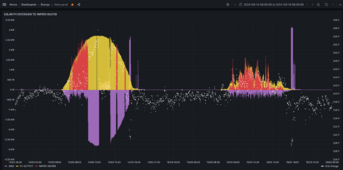
65NW
New Member
I run my 50gal electric water heater on 120v just fine. Its a new rheem from HD.Thank you. I'll have to run some tests, it could be very useful to those that have an inverter with low AC output power.
Do you think it would cause any damage to heating element running on 120V? Apologies if that's a dumb?... The resistance would change so that's why I asked.
Bunch of info here on the subject https://diy.stackexchange.com/quest...g-a-dryer-on-120-v-drive-up-electricity-costs
P=V^2/R where r is the fixed value of the heating elements, halving voltage will give you 1/4 the power consumption. So it takes 4 times as long to heat the water as it would on 240 but I wanted the larger tank for thermal storage over the night. Its way more capacity than I would ever actually use.
hugemoth
Solar Enthusiast
Hard to beat the old top load Whirlpool/Kenmore direct drive washers for reliability and easy repair. I bought one in 1987 and it's still working fine. I let it freeze once and cracked the pump and inlet valve but $20 in parts and 30 minutes of time and it was fixed. It has been powered by an MSW inverter for many years.BE REAL CAREFUL what you buy.
Modern machines are very cheaply built and they designs have been made with a consideration towards low water use and efficient motors.
This does not equate to a long life or even a good job washing.
Your WP is probably a late model of the DD system.
These were washer designed back when whirlpool was asking the techs in the field what they thought and it shows in the ease of service and reliability.
THE WP dryers are also pretty easy to work on with little to go wrong.
fast forward to today the current generation of WP products are designed around a completely different style of tub suspension and the drives have a lot of plastic parts circuit boards and my god the " SPLUTCH "!
I have a WMV system in my wife's Maytag ( now part of whirlpool ).
Its not all its cracked up to be for reliability even in the commercial version
I'm not going to tell you what to buy.
Doesn't matter your going to be disappointed when your DD ( direct drive ) dies and your looking at its disappointing replacement.
Something to think about.
A maytag orbital is all pulley driven pretty simple....
Spin pulley one way it washes other way it pumps and spins.
You could run off your batteries with a DC motor or go completely stone age and run a lawnmower engine
65NW
New Member
I saw the GE HP unit and have been eying it for a few months. It checks a lot of boxes except reliability (only been out for a year or two?).
@hugemoth one of my concerns is freezing. Very cold here and cannot rule out a freeze up event. I imagine the heat pump would be okay in such a case but the headache of losing warrant for an unaffected system if the pump broke or a line cracked. It would only serve to make a claim more difficult if I did have an issue later.
But really, its this or a washer with two dryers. One electric for summer and and a gas for winter. And I dont have room for all three units.
Has anyone seen a gas/electric dryer?
@hugemoth one of my concerns is freezing. Very cold here and cannot rule out a freeze up event. I imagine the heat pump would be okay in such a case but the headache of losing warrant for an unaffected system if the pump broke or a line cracked. It would only serve to make a claim more difficult if I did have an issue later.
But really, its this or a washer with two dryers. One electric for summer and and a gas for winter. And I dont have room for all three units.
Has anyone seen a gas/electric dryer?
dopeassjackson
New Member
Any electric dryer can also be gas..when you start the generator to power it.I saw the GE HP unit and have been eying it for a few months. It checks a lot of boxes except reliability (only been out for a year or two?).
@hugemoth one of my concerns is freezing. Very cold here and cannot rule out a freeze up event. I imagine the heat pump would be okay in such a case but the headache of losing warrant for an unaffected system if the pump broke or a line cracked. It would only serve to make a claim more difficult if I did have an issue later.
But really, its this or a washer with two dryers. One electric for summer and and a gas for winter. And I dont have room for all three units.
Has anyone seen a gas/electric dryer?
65NW
New Member
No, not running a generator to power resistive heating loads.Any electric dryer can also be gas..when you start the generator to power it.
Heat pump maybe.
the btu loss running a generator instead of burning the heat directly in a dryer is more than i can bear.
Hedges
I See Electromagnetic Fields!
- Joined
- Mar 28, 2020
- Messages
- 20,694
CHP, capture waste heat from generator to power dryer.
You could set your electric dryer on heat fluff, use a small generator (but big enough to start motor), run on light load while getting closer to 100% efficiency. As a swag, maybe 66% possible.
(exhaust pipe heat exchanger should be good, don't want cooling air going over clothes unless completely odor free. Water cooled should work but is a much larger generator. Air to air heat exchanger in cooling air might work. Yeah, not everything is cost effective if you do one load a week.)
You could set your electric dryer on heat fluff, use a small generator (but big enough to start motor), run on light load while getting closer to 100% efficiency. As a swag, maybe 66% possible.
(exhaust pipe heat exchanger should be good, don't want cooling air going over clothes unless completely odor free. Water cooled should work but is a much larger generator. Air to air heat exchanger in cooling air might work. Yeah, not everything is cost effective if you do one load a week.)
Similar threads
- Replies
- 4
- Views
- 476
- Replies
- 84
- Views
- 3K
- Replies
- 50
- Views
- 3K
- Replies
- 3
- Views
- 875



